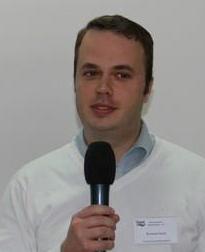Jason Ferenczi: Evangelicals in Ukraine don’t need to hide in their little communities

 Vice President of International Partnerships of the Overseas Council Jason Ferenczi, who oversees consulting and grantmaking to a network of approximately 200 theological schools in Africa, Asia, Europe, Middle East, and Latin America, shares his thoughts on the situation of Evangelical Christians in post-Soviet countries, perspectives of theological institutions and the question of leadership.
Vice President of International Partnerships of the Overseas Council Jason Ferenczi, who oversees consulting and grantmaking to a network of approximately 200 theological schools in Africa, Asia, Europe, Middle East, and Latin America, shares his thoughts on the situation of Evangelical Christians in post-Soviet countries, perspectives of theological institutions and the question of leadership.
You spent a few years in Russia. Do you have Russian background or was it a mission?
I have no Slavic background and grew up on a farm in Ohio. But I always had an interest in the Soviet Union and later Russia. So in 1996 I came to Russia as part of an exchange program with the Council for Christian Colleges and Universities in the United States. They had an agreement for a program in Nizhniy Novgorod state university. It was a wonderful experience.
Let me share one very transformative moment during that trip. I had gone to a small old-style bread store near the university. It was really complicated and hard to understand how to buy food there; my Russian was very poor and I reached the point of crying because I couldn’t figure out what to do. And I went back to my room and decided to go back home. But I decided to wait and this was the turning point, and I fell in love with the place. And I’ve been to that part of the world many times through my work.
How do you feel this part of the world has changed?
I didn’t notice the moment when Russians and Ukrainians started drinking green tea, because it wasn’t the case when I was here for the first time. When I was in Nizhniy Novgorod 16 years ago it was still a strange thing for people to see a foreigner. Now, this part of the world has become more globalized, at least on the surface, maybe not in the depth. And I think that globalization is very superficial and still there is a deep culture and sometimes those two come into conflict. I see continuing adaptation to the global society and at the same time a strong will to hold to some local values.
How do you evaluate the religious situation in Russia from the point of view of Evangelical Christians?
When I lived in Russia I had many friends who were Evangelicals, many friends who were Orthodox, and many who had no faith at all. I’ve learned a lot from the Orthodox. Today as I look at the situation of Evangelical Churches I see ways in which they struggle: there is an assumption that they are somehow different or don’t fully belong in the Russian context even though they have such a long and productive history. I believe that we can reach one another within the Christian community and I respect all these differences. My hope is that in the Russian context there is growth in respect from the Orthodox to the Evangelicals and vice versa.
Evangelical Christians in Ukraine and Russia are a minority, how can they witness fully in this context?
Sometimes numerical strength is not equal to influence. I hope that Evangelical Christians in Ukraine would be salt and light – people who don’t hide in their own little community, who are part and parcel of Ukrainian life: education, media, politics. Evangelicals need to be part of that, not only to have Evangelicals in power. My vision is that they need to be salt and light with quiet, healthy and good influence in a broader society. In Ukraine I see people, especially the younger generation, who are deeply concerned about their society: they care not only about their own church but everything that is Ukraine. They have a good theological background and they are theologically thinking how the church can be a good witness in this part of the world – drawing people into the church and serving them.
I’ve visited a lot of theological schools in this part of the world and I see great potential in places where there is a mutual commitment to very high quality education and at the same time church focus – they focus on the needs of the church. Not to say that everything is practical or meant to meet everyday needs, but it blends together with research, theological thinking that ultimately serves the growth of the church and society.
What is your vision of leadership in the post-Soviet countries?
As a Christian I really believe that the best kind of leadership is the leadership that enables people around you to accomplish something, and I think that it’s certainly the case in theological schools. I see schools here that have leaders who aren’t concerned only about themselves and are not gathering all the powers around themselves. They rather are seeking to enable talented capable people around them to do a better job. In that case not only the work is done better but it creates an atmosphere, culture, society. This allows so much more to happen. This can be applicable to any sphere – leadership that consolidates all the power is not really effective.









